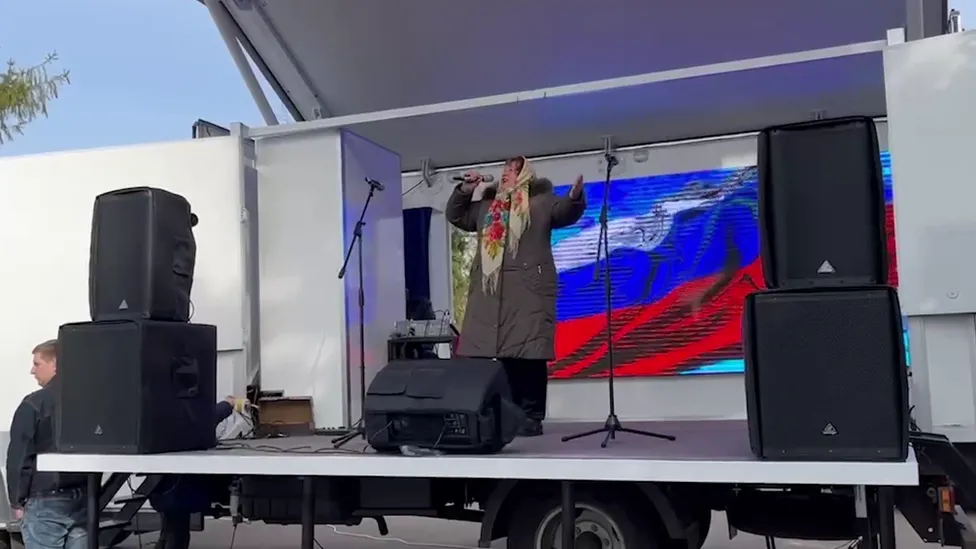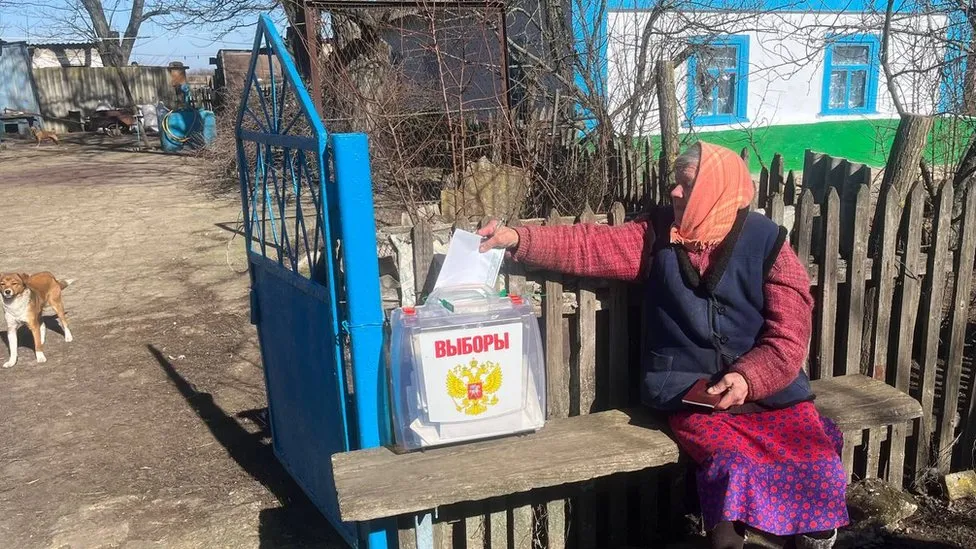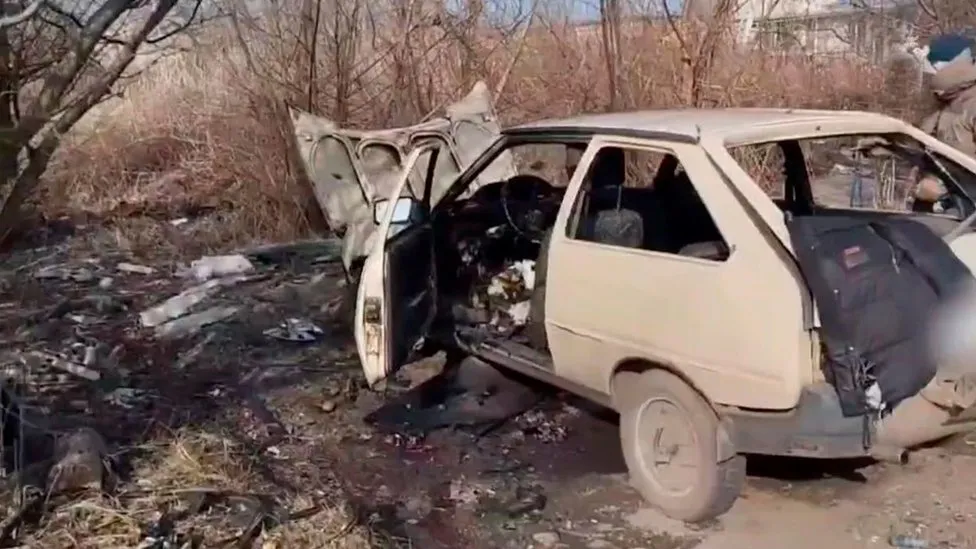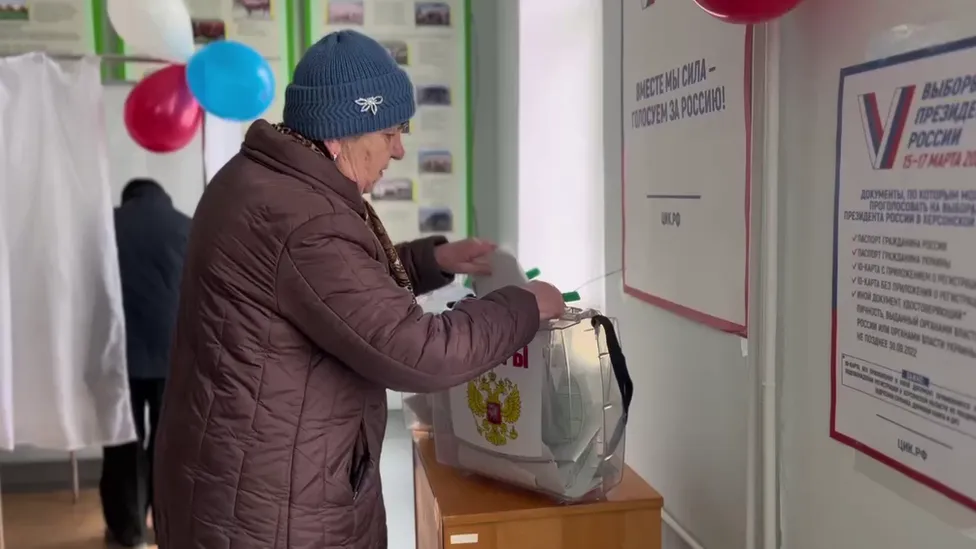Moscow has initiated an extensive campaign urging residents in occupied regions of Ukraine to participate in Russia’s presidential election.
The national vote, spanning three days from March 15th to 17th, includes early voting in the occupied territories of Zaporizhzhia, Kherson, Donetsk, and Luhansk.
Reports indicate instances of pro-Russian collaborators, accompanied by armed soldiers, canvassing neighborhoods with ballot boxes, prompting discontent among residents.
While Vladimir Putin is poised to secure another term, a substantial turnout would bolster the Kremlin’s bid to legitimize his ongoing leadership and justify Russia’s incursion into Ukraine.
Despite four candidates appearing on the ballot, none present a credible challenge, given the suppression of Putin’s most vocal critics, who have either been exiled, imprisoned, or deceased.
Coerced into voting
Voting typically commences early in remote areas of Russia. However, in a departure from the norm, the procedure has been extended to include the four partially occupied regions of Ukraine under the pretext of “security reasons.”
Numerous methods of coercion are being employed to compel Ukrainians residing in the occupied territories to participate in the voting process.

Despite the establishment of polling stations by occupation authorities in the partially occupied regions, voters are not required to physically attend them. Instead, individuals with ballot boxes are being dispatched directly to their homes.
In a social media post, the Russia-installed electoral commission in the Zaporizhzhia region assured voters, “Dear voters, we worry about your safety! You do not have to go anywhere to vote – we will come to your home with ballots and boxes!”
Furthermore, Ukrainians under occupation face pressure from a pro-vote campaign known as InformUIK, purportedly aimed at educating them about the voting process and candidates. However, this campaign often involves visits to residents’ homes, frequently accompanied by armed individuals.
During these visits, personal data is collected to compile voter lists, and sometimes residents are filmed, prompting concerns among locals. The electoral chief in the partly occupied Zaporizhzhia region acknowledged residents’ apprehensions regarding the filming.
Despite previous pressure on Ukrainians to obtain Russian passports, Ukrainian passports are now being accepted as valid identification to facilitate voting, further easing the process for residents.

Residents are receiving text messages notifying them of the voting dates, while traditional Soviet tactics, including offering free concerts and food, are being utilized to entice them to polling stations.
‘It is abnormal when citizens collaborate’
Ukraine has unequivocally denounced the upcoming vote as an illegitimate sham, leading to attacks against those involved in its organization.
Early voting in occupied parts of the Kherson region on February 27th was marred by two explosions in Nova Kakhovka. One targeted the offices of the Kremlin’s United Russia party, while the other occurred near a polling station.
More recently, Ukraine’s Main Intelligence Directorate reported that a local woman aiding the Russian administration in conducting the election was “liquidated” in a car bombing on March 6th in the occupied town of Berdyansk in the Zaporizhzhia region.
Also Read: Zelensky: French army stays if Ukraine stands
When questioned about the perpetrators of the attack, Ivan Fedorov, the Ukrainian governor of the Zaporizhzhia region, stated to the BBC, “Somebody did it. Somebody who displayed significant resistance. Some heroes act in the temporarily occupied territories. Our resistance demonstrates the abnormality of our citizens collaborating with Russians. Someone failed to comprehend this reality, leading to their demise.”

When asked to elaborate on the affiliation of the perpetrators behind the attack, Mr. Fedorov affirmed, “Yes, of course. There is significant cooperation between our resistance within the temporarily occupied territories and our secret services.”
Meanwhile, Russia-installed officials and media in the occupied regions of Ukraine are actively promoting the vote, albeit without emphasizing support for any specific candidate.
Vladimir Putin, the architect of these regions’ annexation by Russia, is implicitly endorsed through the election process, both locally and nationally. The official symbol of the 2024 presidential election, the V-sign associated with Putin’s “special military operation” in Ukraine, underscores this endorsement. Likewise, Russia’s Central Electoral Commission has adopted the slogan “Strong together – vote for Russia!” to reinforce the notion of unity under Putin’s leadership.
Posters featuring the V symbol and the slogan adorn various locations in the occupied parts of Ukraine, including polling stations. Kremlin-controlled media outlets have already hailed early voting in Ukraine as a resounding success.
‘This isn’t democracy, it’s a comedy show’
The Komsomolskaya Pravda tabloid celebrated the early voting campaign in the Kherson region, which concluded on March 3rd, as “a real holiday! With music, balloons, and Russian flags!” claiming tens of thousands of participants.
Kremlin propaganda is leveraging the election to portray unanimous support for Russia’s invasion and annexation of Ukraine. However, these meticulously orchestrated scenes conceal the voices of thousands of critics who have been silenced, deported, imprisoned, or killed. Many, particularly young people, have chosen to depart, unwilling or unable to endure life under Russian occupation due to their dissenting views.

Governor Ivan Fedorov of Zaporizhzhia asserts that local residents in his partially occupied region are being coerced into voting through intimidation tactics. He explained, “They go to every flat and every house and ask – would you like to vote? Our citizens are very afraid. Of course, if Russians with soldiers come to their flat and ask if they’d like to vote for Putin, everyone will say: OK, yes. Because everyone wants to save their life. But it does not mean that our citizens want to support Putin.”
In the Kherson region, occupied by Russian forces in the southeastern part, a resident described to the BBC how voting was organized in his village, though their name and location cannot be disclosed due to security concerns.
“Pro-Russian locals visit households with ballot boxes, accompanied by armed military personnel. If they knock and no one opens, they move on to the next house. They don’t break into houses, but they do visit,” the local resident stated.
They added, “This is ridiculous. What kind of election is it when there are two locals – one holding a list of voters and the other a ballot box – and a military man with a machine gun? This isn’t democracy. It’s a comedy show.”

